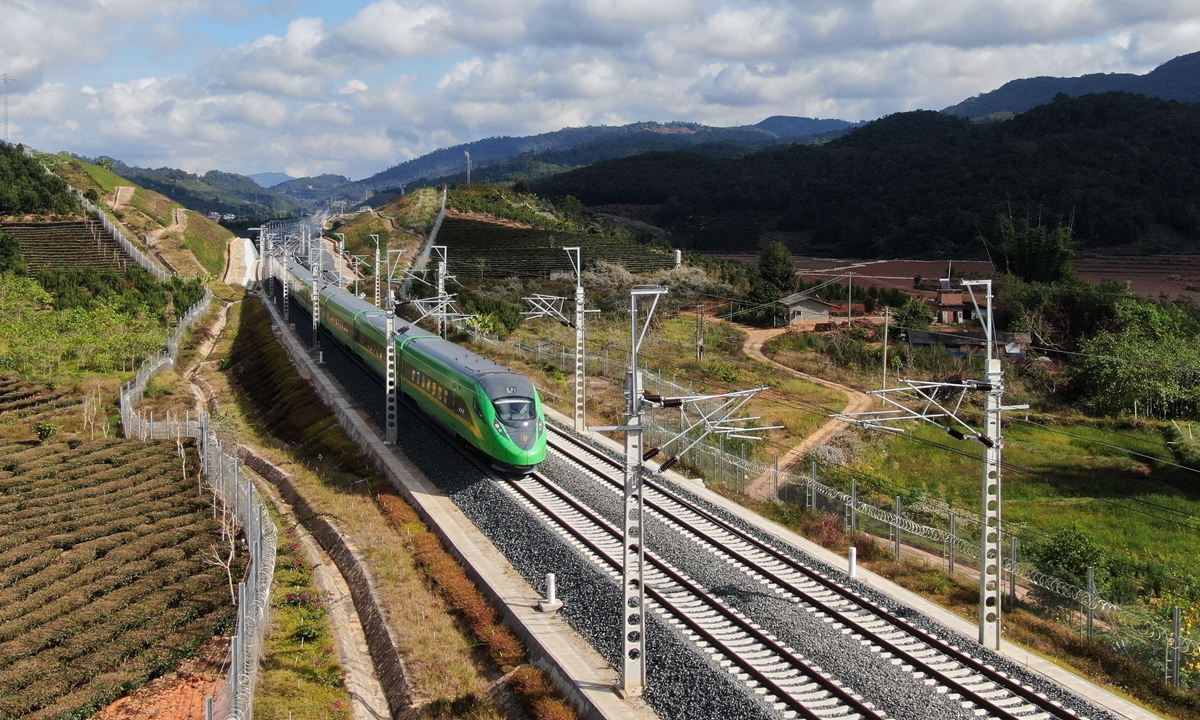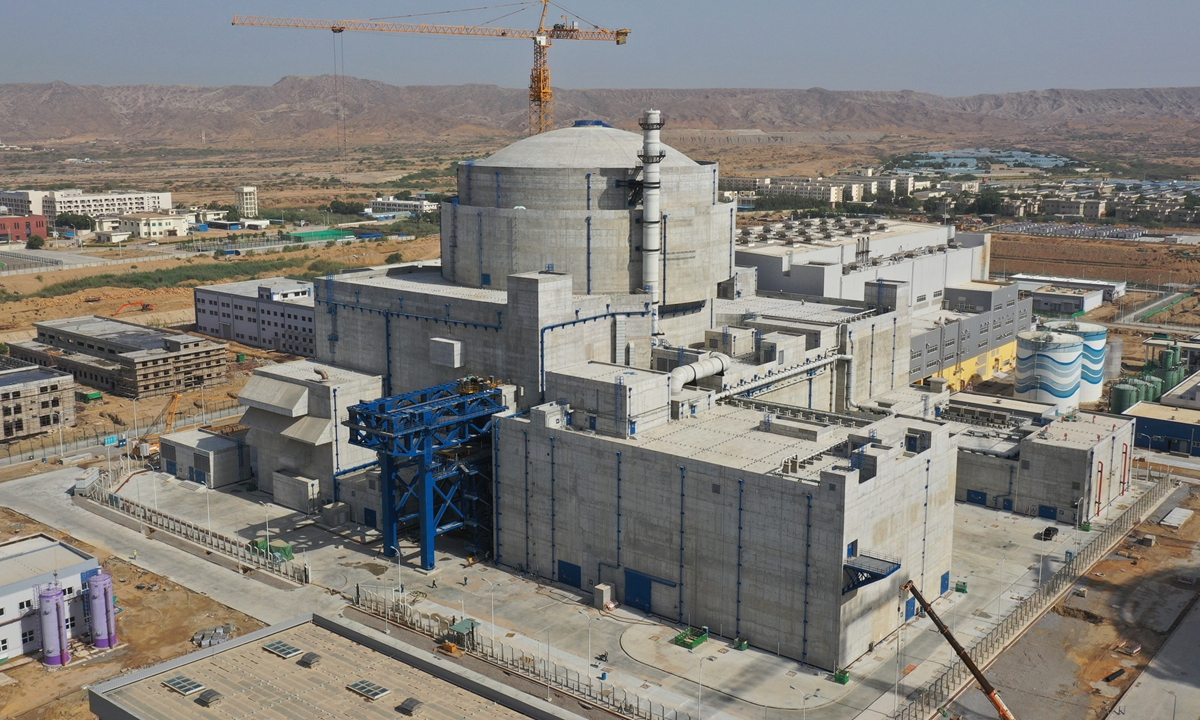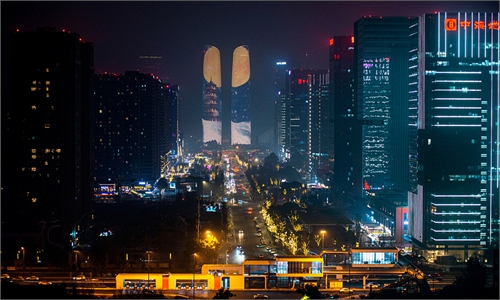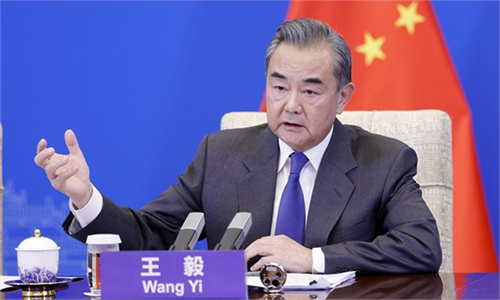Cooperation on BRI infrastructure, high-tech and nuclear energy take center stage amid two sessions
Cooperation on infrastructure, high-tech and nuclear energy take center stage

An international freight train on the China-Laos Railway in Southwest China's Yunnan Province on Jan 3 Photo: Xinhua
Fostering further cooperation between China and countries under the Belt and Road Initiative (BRI) was among hot topics during the ongoing two sessions in China, including proposals on infrastructure, high technology, nuclear energy, vaccines and advanced medicine.
Over the past year, solid progress has been made when it comes to the "hard connectivity" of infrastructure cooperation under the BRI, China's State Councilor and Foreign Minister Wang Yi elaborated on Monday China's foreign policy and foreign relations at a press conference on the sidelines of the fifth session of the 13th National People's Congress (NPC) on Monday.
"China will work with the international community to continue advancing high-quality BRI cooperation as it has maintained sound momentum despite the impact of the COVID-19 pandemic and other factors," Wang said.
Deputies to the NPC and members of Chinese People's Political Consultative Conference (CPPCC) submitted their proposals on BRI cooperation during the two sessions.
Energy demand
Wan Gang, Secretary of the Party Committee of Nuclear Power Institute of China and a member of the National Committee of CPPCC, said that nuclear energy is the most realistic choice for addressing the contradiction between economic and social development and demand for energy, considering the vast majority of countries under BRI are developing countries.
He proposed strengthening coordination at the national level, introducing nuclear export financing policies and increasing engagement across international organizations and events to promote the reach and competitiveness of China's nuclear power industry, the Global Times has learned.
"We can build an energy community with a shared future for mankind with nuclear power as a bond," said Wan.
China has become one of only a few countries in the world to master a fourth generation of nuclear energy technology. To date, China has exported 14 nuclear power units and research units to the international market, including six nuclear power units to Pakistan.
The latest example was the K-3 unit of the Karachi Nuclear Power Project in Pakistan, adopting China's Hualong One nuclear reactor, which was successfully connected to the grid on March 4 this year.
In addition to nuclear power, the application of nuclear technology has also been a focus of the two sessions.
"For a long time, China's heavy reliance on imported isotopes has caused instability in the supply of isotopes and drugs, which has severely restricted the development of nuclear medicine in China and affected the normal development of medical and clinical work," Wan said.
Wan has proposed the construction of China's medical isotope and pharmaceutical industry pilot demonstration zone in Southwest China's Sichuan Province.

A view of Karachi Nuclear Power Plant Unit-2 (K-2) in southern Pakistani port city of Karachi on May 19, 2021 Photo: Xinhua
Financial safety
Fiscal and financial support is indispensable in the promotion of various projects under the BRI. In recent years, China has provided a large amount of loan assistance to some economically underdeveloped countries, which has played an important role in local economic and social development.
At present, many of the loans have come due and need to be repaid by recipient countries. However, due to the insufficient fiscal revenue of donor countries and the impact of COVID-19, many countries have encountered difficulty in repaying their debts.
Zhang Shuibo, a member of the National Committee of the CPPCC and Dean of the School of International Project Management of Tianjin University, told the Global Times that the debts due to be repaid to China should be exempted, reduced, delayed or transferred according to the social and economic development situation and resource endowment of debtor countries, the Global Times has learned.
Zhang has either participated in or provided consulting service to a number of BRI projects including China-Central Asia Gas Pipeline, China-Myanmar pipeline, Sri Lanka port city and Hungary-Serbia railway.
"As overseas assets, especially major infrastructure projects, face very complex political, economic and social external environment, the safety management of overseas assets should become a core concern," said Zhang.
The construction and operation of projects under the BRI should strengthen safety management of assets, including prevention of terrorist attacks and ensuring market confidence, according to a proposal he submitted to the CPPCC obtained by the Global Times. Full research and preparation should be made for major projects from feasibility studies, investment and financing decisions, construction and operation, said Zhang.
Bright prospects
NPC deputies and CPPCC members also referenced technology cooperation and localization of the BRI, which aim at improving the livelihood of locals in host countries.
Since 2013, the BRI has made remarkable achievements. So far, China has signed 206 cooperation documents. The accumulated trade volume between China and BRI countries totaled $10.4 trillion since 2013, accounting for more than 30 percent of China's total foreign trade of goods during the period.
China has established more than 80 cooperation zones in countries along the Belt and Road, with a total investment of $50.7 billion, contributing to tax revenue and employment in host countries.
According to a Research report published by the World Bank in June 2019, if fully implemented, the BRI will increase the trade of participating countries by 2.8 percent to 9.7 percent and between 1.7 and 6.2 percent for the world. Increased trade is expected to increase global real income by 0.7 to 2.9 percent
Referring to the BRI, Neak Chandarith, director of the Cambodia 21st Century Maritime Silk Road Research Center, said the program had played an important role in contributing to Cambodia's development strategies, according to the Xinhua News Agency.
"The BRI projects will be the major contributors to Cambodia's economic growth in the post-pandemic era," he said.


